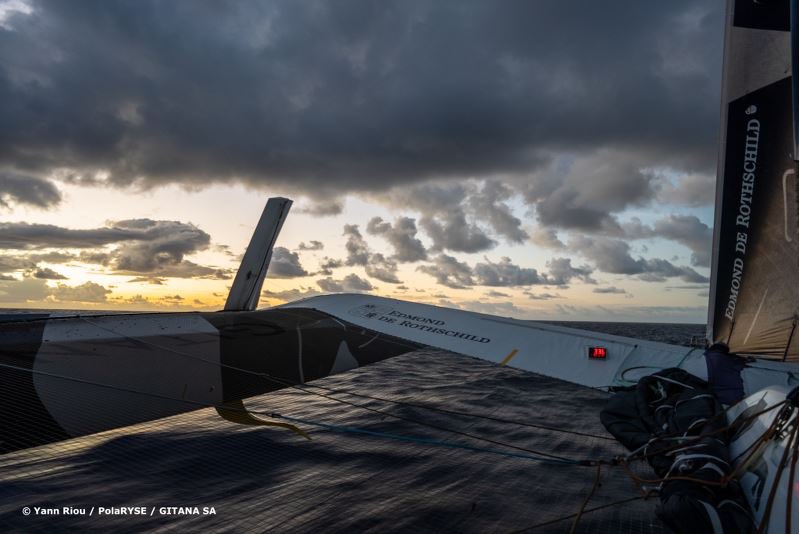

Aboard the Maxi Edmond de Rothschild, there was rather a peculiar atmosphere yesterday; a combination of the very bad and sad news coming from land and the complete contrast with the immediate environment on the 32-metre giant. In fact, for the past 36 hours, Franck Cammas and Charles Caudrelier’s crew has been benefiting from ideal conditions for both the men and the machine. The six sailors are slipping along on a long port tack offshore of the Brazilian coast and should pass the latitude of Cabo Frio and Rio de Janeiro at the end of the day. Indeed, despite the SE’ly breeze easing to around 12 knots since the middle of the night, they are powering southwards at an average speed of around 20 knots. Yesterday was also very interesting purely in terms of miles in the bank as it enabled the sailors of Gitana Team to rack up a lead of over 280 miles in relation to their virtual adversary.

The first week of the record attempt
After setting sail from Ushant on 10 January at 01:33 UTC, the crew of the Maxi Edmond de Rothschild ticked off the first week of its Jules Verne Trophy record attempt last night offshore of Brazil. Seven days, during which time the latest Gitana has covered 4,700 miles over the ground, namely relative to the surface of the earth, at an average speed of 28 knots. When you’re aware that the latter number includes the 24 hours at a virtual standstill in the doldrums, you get a better understanding of how fast life is whizzing by on Gitana 17. This long sprint southbound on port tack, which began on exiting the intertropical convergence zone, clearly marks a transition between two highlights of the descent of the Atlantic. These more ‘peaceful’ times now, which are just as quick, are much appreciated by the crew: “All’s well aboard! It’s fairly calm here. The conditions are enabling us to get some rest, as the temperatures are neither too hot nor too cold and the combination of ordered seas and a medium wind are allowing us to make good gains along the course. We must have covered over 700 miles in one day yesterday, with around fifteen knots or so of breeze, which is very pleasing it has to be said”, admitted Yann Riou at daybreak.
Appointment confirmed
On setting sail on the crewed round the world record under sail one week ago, Franck Cammas, Charles Caudrelier and their weather router Marcel van Triest were targeting a precise date and time to the south of Brazil. The idea is to position themselves offshore of Latin America just as a front bound for the Deep South detaches itself from the continent. The race to make the connection with this train of low-pressure looks nicely on track and should take place early in the week. In just a matter of hours, life aboard will change drastically aboard as they hitch a ride on the express train south. Fleece layers, gloves and hats will make their comeback on the deck of the blue flying maxi-trimaran, whilst the permanent whistling of the appendages will cause the decibels to ratchet up. As such, days synonymous with a transition, like those the six members of the crew are currently experiencing, are a precious commodity for getting rest and recharging the batteries.
Notifications